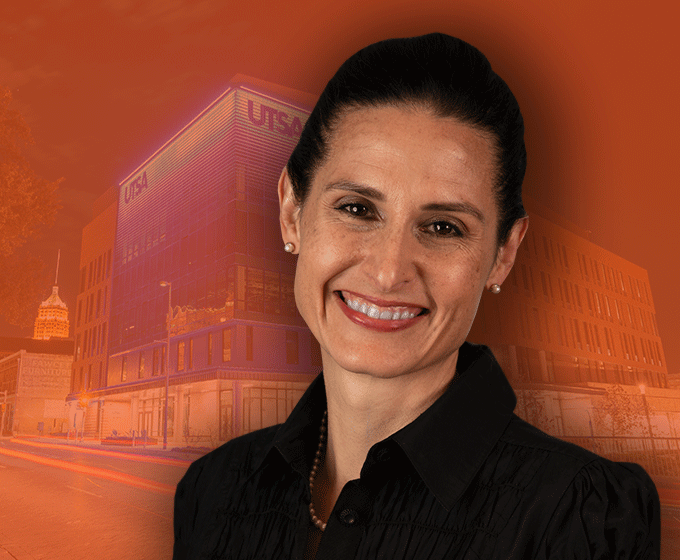
MAY 31, 2023 — Ginny Garcia-Alexander, an associate professor of sociology in the UTSA College for Health, Community and Policy, has been appointed as a faculty fellow at the university’s School of Data Science. For the next two years, Garcia will lead the next-generation census research initiative, a partnership between UTSA and the U.S. Census Bureau.
Faculty fellows advance projects aimed at ensuring UTSA’s future as a leading center of data science research and education, while also promoting relationships across the public and private sectors and within the university’s data science community.
The partnership between UTSA and the Census Bureau is responding to the national demand for data about people, places and the economy that is more timely, accurate and granular to help address grand challenges that the nation faces.
As the faculty fellow leading the program, Garcia-Alexander will serve as the lead investigator and program coordinator, developing curricular and research agendas for the initiative. She earned her M.S. and Ph.D. in sociology with a concentration in social demography from Texas A&M University. In 2020, Garcia-Alexander joined the UTSA Department of Demography from Portland State University, where she was a faculty member from 2012 until early 2020.
“This is really opening up a world of possibilities in terms of opportunities for the students, faculty, researchers and people in the community,” Garcia-Alexander said.
According to Garcia-Alexander, the Census Bureau has a long history of collaborating with universities all over the country. These partnerships prove incredibly valuable for universities by enabling access to resources and personnel that may ordinarily be unavailable.
“A huge portion of what we are trying to do is create a new generation of data scientists,” Garcia-Alexander said, “so one of the really neat things about this partnership with the Census Bureau is that are we going to have access to their vast array of data products and to their technical experts.”
In the coming months, Garcia-Alexander will be establishing a variety of opportunities for students including research and project-based learning using Census Bureau data, lectures for the university community and workshops with Census Bureau personnel. Participating in these opportunities can give students a competitive advantage as they pursue careers in a variety of data-driven fields—from sociology, to medicine and business.
“There are going to be opportunities for people who have bachelor’s degrees, there are going to be opportunities for people who have a master’s and all the way up the Ph.D. level,” Garcia-Alexander said. “There’s a huge need for people who can engage with data, so through this work we are setting up students to be very marketable.”
Garcia-Alexander also envisions UTSA serving as a bridge between the San Antonio community and Census resources over her fellowship. In the first year, Garcia-Alexander will identify interested parties and begin to establish connections and collaborations, while the second year will be devoted to getting the program and its myriad components operational and engaging students, faculty and community members.
“We hope we will have a really well-established data hub—that UTSA will be seen as a place where you can go to use and be involved with the resources that we have and to make greater use of Census Data products and services,” Garcia-Alexander said.
The School of Data Science, the only one of its kind at a Carnegie R1 Hispanic Serving Institution, was established to lead the nation in data-intensive research and educate top data scientists who can make the world more equitable, informed and secure.
UTSA’s College for Health, Community and Policy is dedicated to developing solutions to effect change for complex social issues to improve the well-being of communities and the world.
UTSA Today is produced by University Communications and Marketing, the official news source of The University of Texas at San Antonio. Send your feedback to news@utsa.edu. Keep up-to-date on UTSA news by visiting UTSA Today. Connect with UTSA online at Facebook, Twitter, Youtube and Instagram.
Move In To COLFA is strongly recommended for new students in COLFA. It gives you the chance to learn about the Student Success Center, campus resources and meet new friends!
Academic Classroom: Lecture Hall (MH 2.01.10,) McKinney Humanities BldgWe invite you to join us for Birds Up! Downtown, an exciting welcome back event designed to connect students with the different departments at the Downtown Campus. Students will have the opportunity to learn about some of the departments on campus, gain access to different resources, and collect some giveaways!
Bill Miller PlazaJoin us for an intimate evening of cocktails, conversation, and culinary inspiration with Pati Jinich, Emmy-nominated chef and James Beard Award-winning author. Enjoy light bites and signature drinks in the warm, modern setting of Mezquite as Pati connects with guests over her passion for Mexican cuisine and storytelling.
Mezquite Restaurant in Pullman Market, 221 Newell Ave., San Antonio 78215From inspired courses to thoughtful pairings and a rich sense of community, the Ven a Comer Signature Dinner is a night of shared meals, shared stories, and unforgettable flavor.
Stable Hall (Pear Brewery), 307 Pearl Pkwy, San Antonio 78215Come and celebrate this year's homecoming at the Downtown Campus with food, games, giveaways, music, and more. We look forward to seeing your Roadrunner Spirit!
Bill Miller PlazaThe University of Texas at San Antonio is dedicated to the advancement of knowledge through research and discovery, teaching and learning, community engagement and public service. As an institution of access and excellence, UTSA embraces multicultural traditions and serves as a center for intellectual and creative resources as well as a catalyst for socioeconomic development and the commercialization of intellectual property - for Texas, the nation and the world.
To be a premier public research university, providing access to educational excellence and preparing citizen leaders for the global environment.
We encourage an environment of dialogue and discovery, where integrity, excellence, respect, collaboration and innovation are fostered.